Key takeaways:
- Advocacy burnout arises from prolonged engagement, emotional strain, and a culture of constant availability, leading to fatigue, cynicism, and diminished motivation.
- Implementing coping strategies such as setting boundaries, prioritizing self-care, and connecting with fellow advocates can help alleviate burnout.
- Preventing burnout involves reassessing commitments, incorporating downtime, and practicing gratitude to maintain a positive mindset.
- Community support and open discussions about challenges can foster solidarity and rejuvenate the spirit of activists.
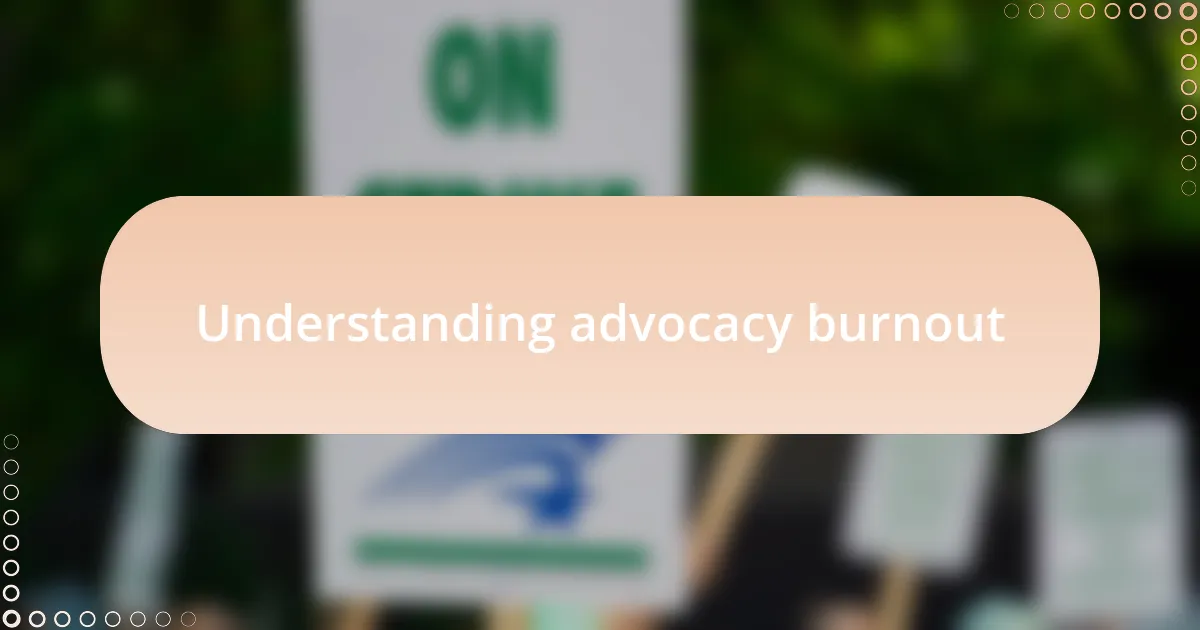
Understanding advocacy burnout
Advocacy burnout is a phenomenon that many activists encounter after prolonged engagement in social justice efforts. I remember a time when I felt completely drained after countless hours spent organizing protests and advocating for peace. The weight of constant urgency in activism can create a relentless cycle of stress that leaves one questioning their commitment—shouldn’t the pursuit of justice inspire me rather than deplete my spirit?
The emotional toll of advocacy burnout is profound. I often reflect on how it can morph one’s passion into exhaustion, leading to feelings of hopelessness and isolation. Have you ever felt that way, where each email and meeting felt more like a chore than a mission? The passion that once fueled my activism began to wane, overshadowed by fatigue and an overwhelming sense that my efforts were insufficient.
Understanding the nuances of advocacy burnout can be a game-changer for personal well-being in activism. It’s not just about feeling tired; it’s about recognizing that the quest for change can also necessitate periods of rest and self-care. I’ve learned that acknowledging these moments of burnout doesn’t equal failure; instead, it’s a sign that we’re human, navigating a complex landscape of hope and despair.
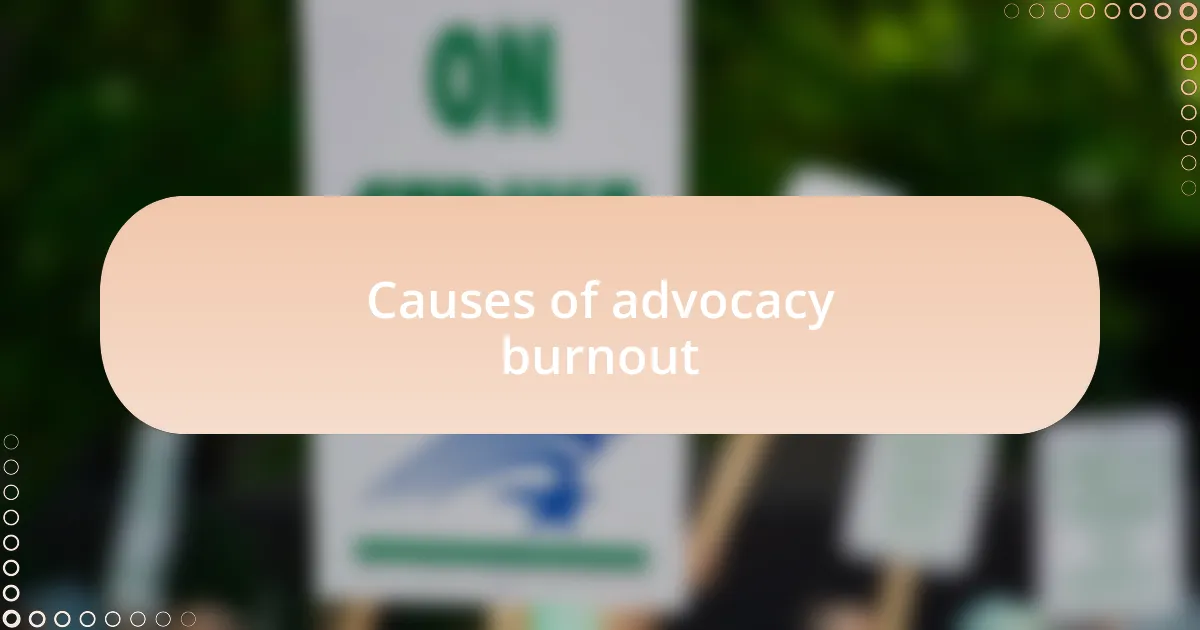
Causes of advocacy burnout
The causes of advocacy burnout often stem from the relentless pace of activism. I remember a time when I was grappling with a demanding schedule, constantly juggling meetings, events, and campaigns without taking a moment to breathe. Can you relate? That overwhelming workload can lead to a depleted sense of self, where I felt less like an advocate and more like a cog in a never-ending machine.
Another significant factor is the emotional strain associated with the issues we confront daily. I recall moments of deep despair when the realities of war and injustice weighed heavily on my heart. It’s unimaginable how witnessing such suffering can disturb one’s mental peace, prompting feelings of inadequacy—like no matter how hard I fought, I was never enough to tackle the vastness of the problems around me.
Finally, a culture of constant availability in advocacy can exacerbate burnout. I often felt compelled to reply to every message immediately, yet that pressure blurred the lines between my personal time and activism. Have you ever experienced that urge? It’s important for us to recognize that setting boundaries is not selfish; it’s essential for sustaining our long-term commitment to the causes we hold dear.
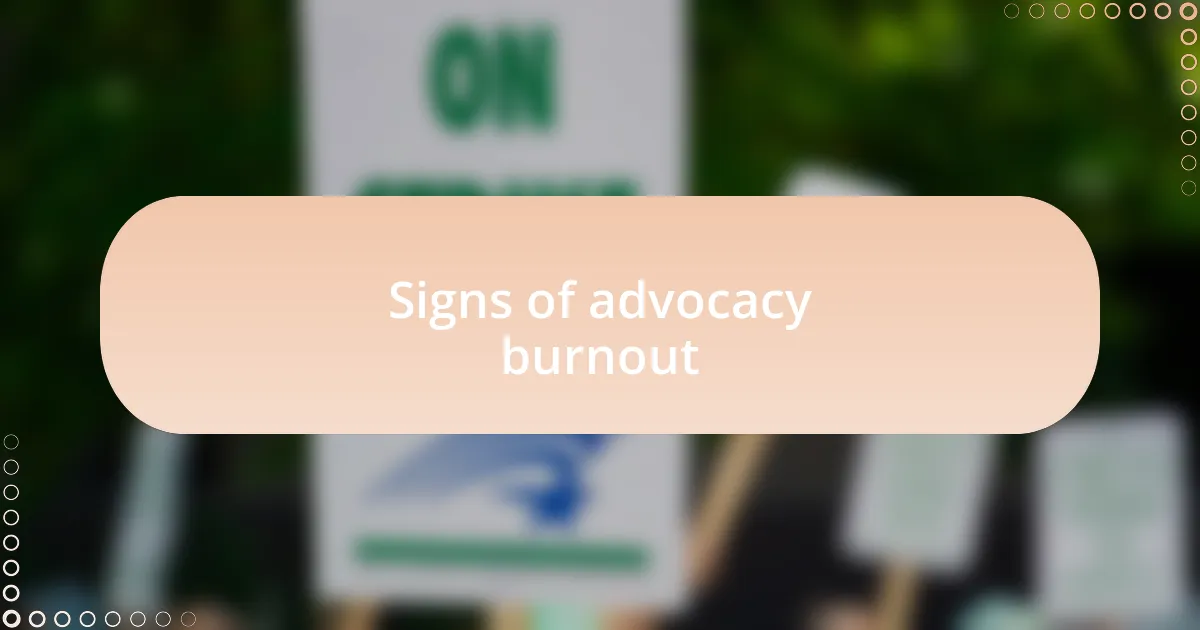
Signs of advocacy burnout
Recognizing advocacy burnout is crucial, and one of the first signs I noticed in myself was persistent fatigue. I remember waking up each day feeling like I had run a marathon in my sleep, mentally drained before even starting my advocacy tasks. This overwhelming tiredness often left me questioning if I even had the energy to engage, let alone stir change.
Another indicator is a growing sense of cynicism. I can vividly recall a time when I found myself rolling my eyes at activism events, feeling detached from the very cause I once fervently believed in. It’s difficult to advocate passionately when you’re caught in a cycle of doubt and frustration—have you felt that shift, too? This emotional withdrawal is a red flag, signaling a need to reassess my involvement and mental well-being.
A noticeable change in motivation can also signal burnout. There were moments when I would scroll through emails or social media updates, and instead of feeling inspired, I felt an overwhelming sense of apathy. It’s disheartening to reflect on how that spark fades, reminding me of the importance of self-care amidst the chaos of advocacy. Understanding these signs creates the opportunity for us to pause, regroup, and reignite our passion for the causes we champion.
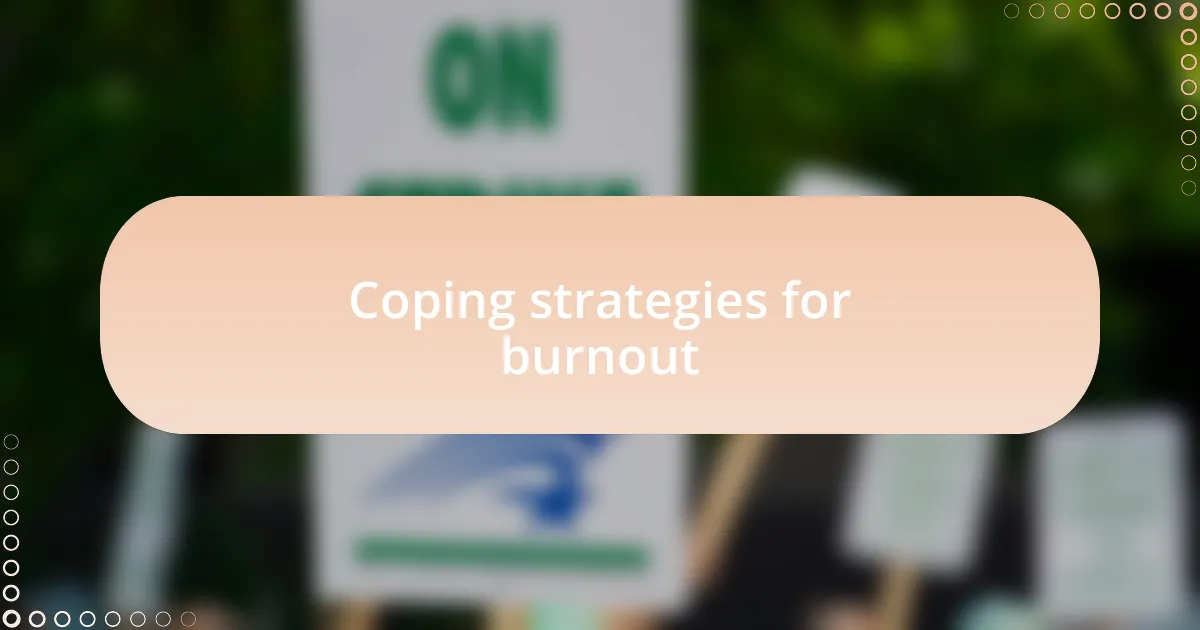
Coping strategies for burnout
Finding effective coping strategies for burnout is essential in the advocacy world. One approach that has worked wonders for me is establishing clear boundaries. I recall a time when I felt overwhelmed by constant notifications from social media and email. By dedicating specific times to check these channels, I reclaimed valuable mental space, allowing myself to engage fully during those designated times without the ceaseless pressure of always being “on.”
Another tactic is to prioritize self-care. I’ve learned that simply taking a walk or spending time in nature can refresh my perspective. There was a particularly stressful week when I decided to disconnect for a few hours and explore a local park. The fresh air and tranquility helped clear my mind, and I came back to my advocacy work with renewed energy. Have you ever noticed how a brief escape can rejuvenate your commitment?
Additionally, connecting with fellow advocates can be incredibly comforting. I remember joining a support group where we could openly share our struggles. Just hearing others articulate their feelings helped me realize I wasn’t alone in my experience. It turned into a space where we could collectively strategize, share resources, and offer encouragement. This camaraderie not only lightened the weight of burnout but also fostered a deeper sense of community in our shared journey.
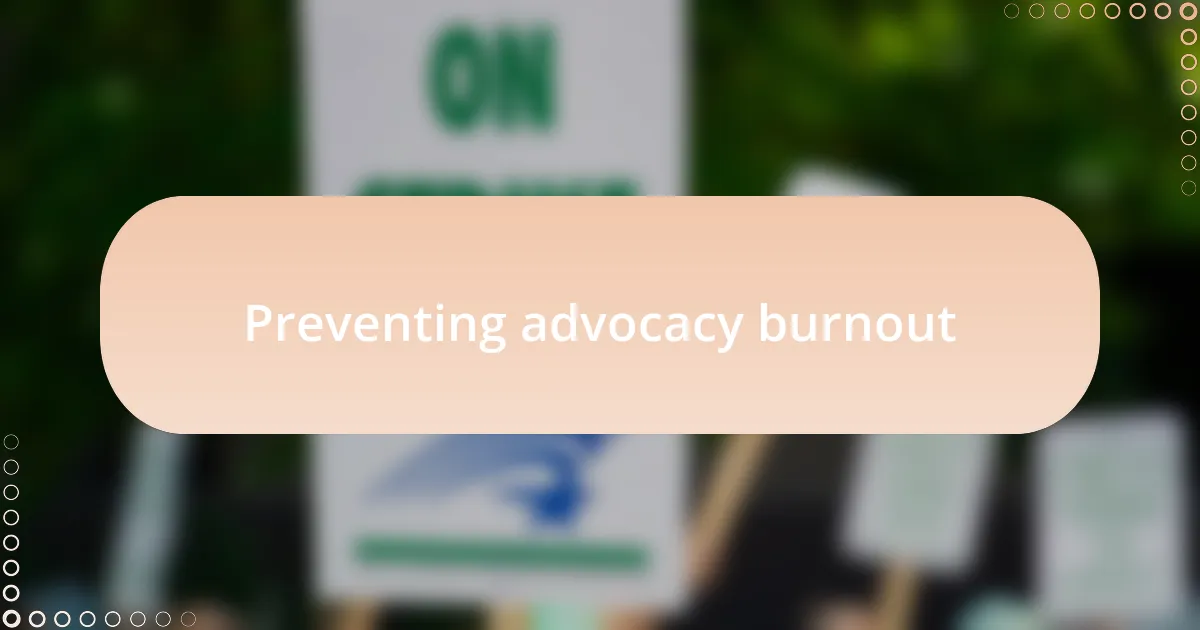
Preventing advocacy burnout
Finding balance in advocacy is crucial for preventing burnout. I once took a step back and reassessed my commitments, realizing I had overextended myself. It was a tough decision to say no to some projects, but it ultimately allowed me to invest more time and energy into the causes that truly mattered to me. Have you ever felt that weight lift once you’ve made the choice to focus on your priorities?
Incorporating downtime into my schedule has been a game-changer. I still remember a period when I’d book back-to-back meetings, thinking I was being productive. That changed when I started carving out non-negotiable breaks in my calendar for creative activities. Whether it was painting or simply chilling with a good book, these moments of joy not only recharged me but also sparked new ideas. Isn’t it amazing how stepping away can lead to fresh perspectives?
Lastly, practicing gratitude has transformed my approach to advocacy. Each day, I jot down three things I’m thankful for, often tied to my work. This simple habit fosters a positive mindset, reminding me why I joined the movement in the first place. When was the last time you paused to reflect on the wins, no matter how small? Embracing these little moments has made the challenging days feel a bit lighter for me.
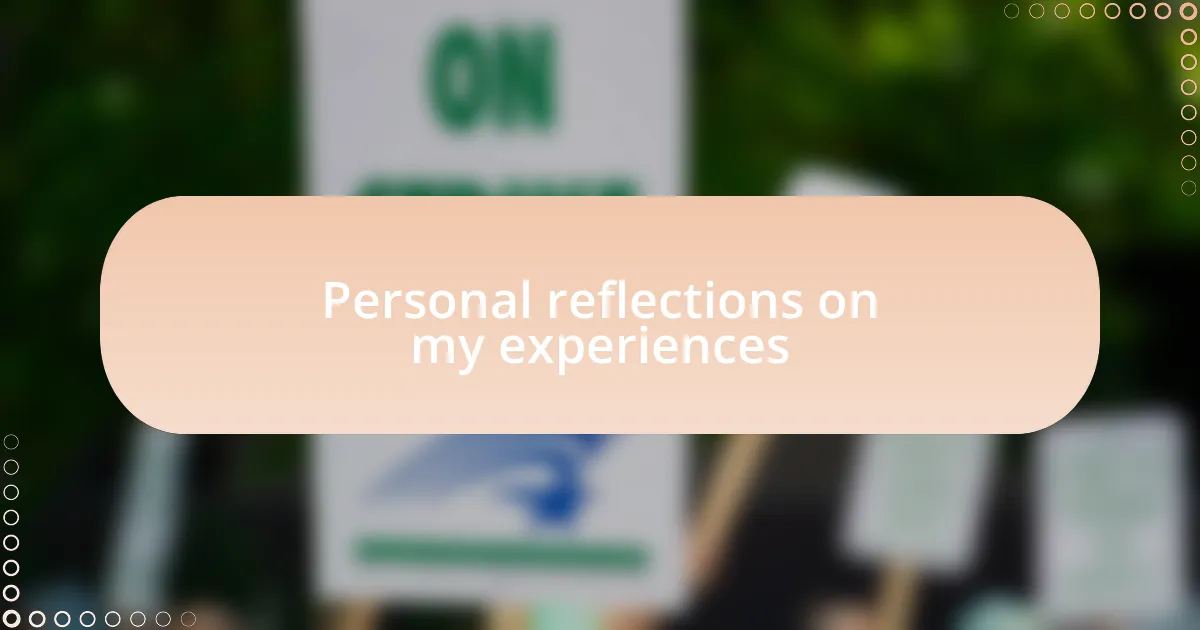
Personal reflections on my experiences
Reflecting on my journey, there have been moments when the weight of advocacy felt overwhelming. I recall a late night when I was drafting a passionate letter against military intervention, yet my mind kept drifting to personal responsibilities. That evening, I realized that my fervor for change shouldn’t come at the cost of my own well-being. Have you ever felt that tug-of-war between your commitment to a cause and your personal life?
There was a time when I thought burning the midnight oil was synonymous with passion. I vividly remember ending days drained but feeling accomplished, only to find that I was neglecting relationships that mattered deeply to me. Now, I make it a point to reconnect with friends over coffee or a walk in the park. Those moments remind me that advocacy is not just about fighting battles; it’s also about nurturing the connections that fuel our resolve. How often do we forget to take a breath and enjoy the companionship around us?
I’ve learned that sharing my vulnerabilities can foster deeper connections with other activists. Once, during a meeting, I openly discussed my struggles with burnout and the fears it brought. To my surprise, many others nodded along, sharing similar experiences. This exchange reminded me that we are all navigating this path together, and expressing vulnerability can be a powerful tool for solidarity. Have you ever opened up about your challenges and found strength in shared stories?
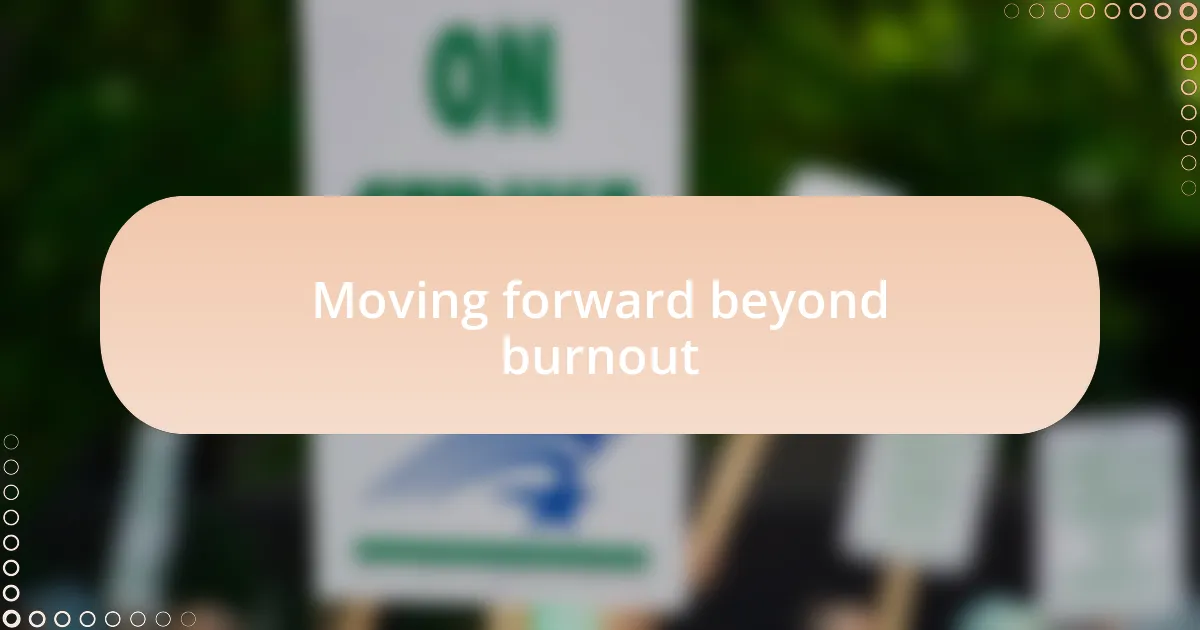
Moving forward beyond burnout
It’s essential to recognize that moving forward beyond burnout involves embracing the idea of self-care without guilt. I remember a turning point during a particularly intense campaign when I took a weekend off to recharge. That break allowed me to return with fresh perspectives and renewed energy. Have you ever paused your advocacy efforts to focus on yourself, only to find that you came back with even more determination?
Another vital aspect of recovery is learning to set boundaries. In my experience, saying “no” has been liberating. There was a time when I accepted every request that came my way, leading to exhaustion. By prioritizing the commitments I was genuinely passionate about, I found it much easier to remain engaged and effective. How often do you take a moment to evaluate whether a new obligation truly aligns with your goals?
Lastly, I’ve discovered the power of community support in combatting burnout. I now actively participate in a local group where we share successes and struggles alike. Just last month, we held a gathering focused on mental health strategies for activists, and the turnout was incredible. This sense of belonging has not only rejuvenated my spirit but also provided valuable tools for sustainably advocating for change. Have you sought out connections that encourage not just action but also self-care?